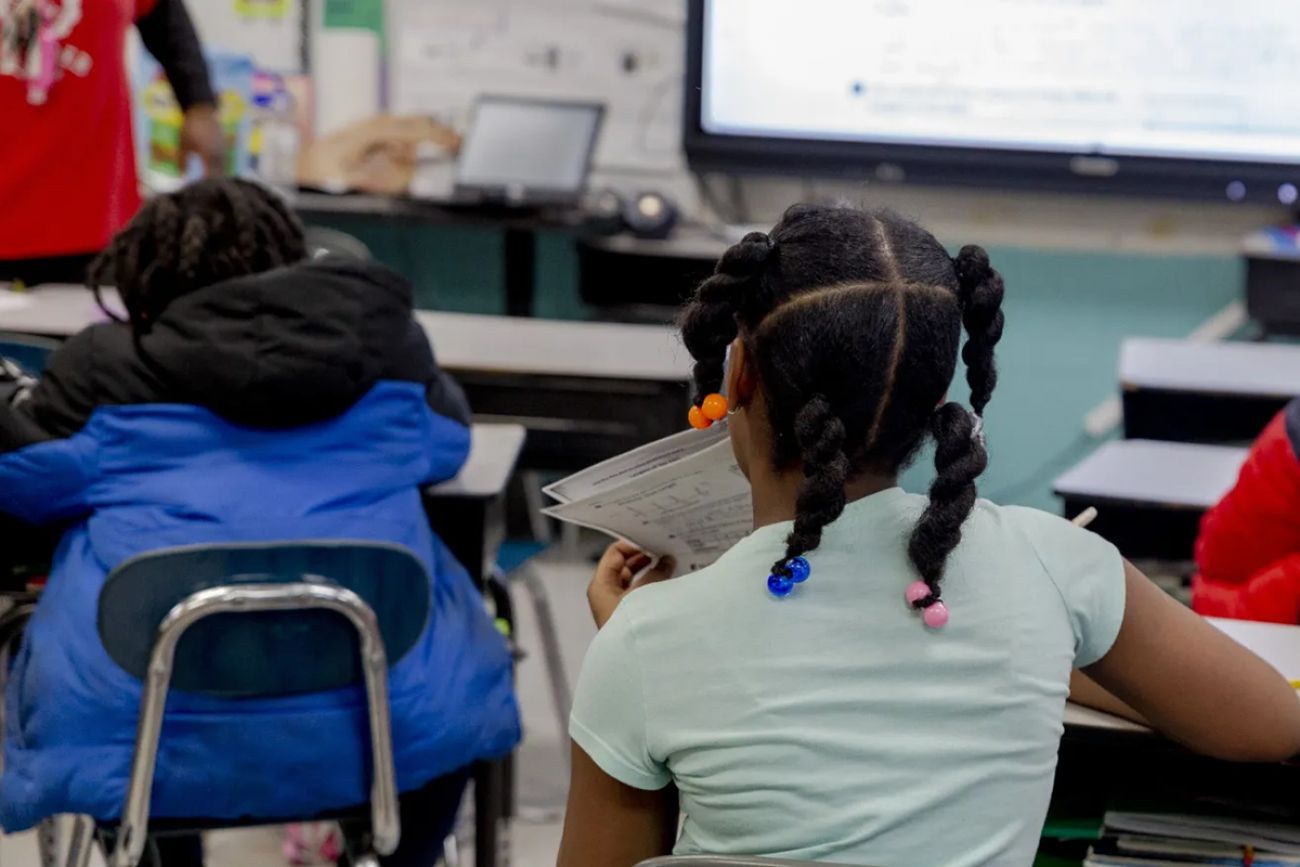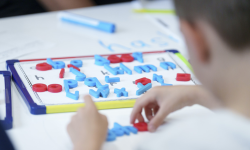Michigan school mental health program set to expand with $50 million boost

- A Michigan program that helps students manage emotions is getting a $50 million boost
- The funding comes as students need more help with isolation and other mental-health challenges
- It’s among several legislative initiatives to help students thrive after the pandemic
The last time administrator Kristina Hansen intervened in a school fight, she didn’t have to say much.
One of the students already knew what he should have done differently.
“That would have been a perfect time to practice my breathing, but I didn’t,” the student told her after a brief shoving match with another boy in the cafeteria at Bark River-Harris Junior High School in the Upper Peninsula. “I blew my lid.”
Related:
- Flint may ditch year-round school, but other districts say it helps students
- What Michigan schools could look like under Tudor Dixon, Gretchen Whitmer
- Detroit superintendent’s wife leaves nonprofit after backlash over contract
He had forgotten to use the tools he learned in TRAILS, a program his school adopted last year to help students manage emotions and make good decisions. With more exposure to the program and more practice using its techniques, he’ll be able to calm himself before his behavior escalates, said Hansen, who was hired last year as the Bark River-Harris School District’s student success coordinator. She runs programs to support students academically and behaviorally including TRAILS, which stands for Transforming Research Into Action to Improve the Lives of Students.
Developed a decade ago at the University of Michigan, the program now is in about 700 schools and could soon be in a lot more thanks to a nearly tenfold boost in state funding.
The state school aid budget signed into law last month provides for $50 million in funding over the next four years. That’s a big jump from last year’s overlapping state appropriation of $5.4 million over three years.
“The beautiful thing about the last two years’ worth of budgets is that the state has acknowledged that not only are children’s mental health challenges profound in the state, in the country, but that the Legislature has to be a part of the solution,” state Superintendent Michael Rice said.
The additional funding comes as schools struggle to find enough resources to help students recover from grief, loss, social isolation, trauma, and other mental health effects of the pandemic. School leaders across the country are reporting more classroom disruptions, student fights, and physical attacks that they attribute to lingering effects of the pandemic. Misbehavior was a defining characteristic that complicated efforts to get children back on track academically after two years of disjointed learning.
The boost for TRAILS is just one way the state Legislature is trying to address the problem in Michigan. The 2022-23 budget also creates a new $150 million program for mental health grants and provides $25 million for school-based health centers — up from $11 million last year. Many school districts also are tapping federal COVID relief funds to bring mental health programs to their students.
Elizabeth Koschmann, TRAILS founder and executive director, said the new funding will make a big difference in the number of students the program reaches over the next four years.
She couldn’t provide a total operating budget because TRAILS is funded on a project-by-project basis from numerous sources, including federal grants, private donations, and Medicaid reimbursements for its work in high-poverty areas.
TRAILS provides resources, training, and consulting to school staff members at all levels, from support staff through administrators. In some schools, only one or two teachers have gone through the training, but the program works best when everyone participates.
“What’s important is that we not delegate mental health to a single individual or a couple individuals in a school,” Rice said.
At Bark River-Harris, every staff member and all 725 students in the district have been exposed to the program’s first tier, which provides 15 hours’ worth of lessons teachers can deliver to their classes to introduce them to mindfulness and self-care practices.
Other tiers of the TRAILS program offer training in suicide risk management and facilitating small group sessions for students who need extra support.
Hansen said all of her teachers find ways to make time for the TRAILS curriculum, even if it takes time from academics. That’s true in other districts, too.
“We’re not hearing from (teachers) that it’s interfering with academic content delivery, because they need this content, too,” Koschmann said. “They’re saying their kids, almost across the board, are one to two years behind socially and developmentally from where they should be. … They’re saying they need an anchoring program to bolster basic skills.”
Nationally, spending on such social and emotional learning programs grew almost 50% between 2019 and 2021, according to one report.
While teachers are on board, some parents are skeptical of TRAILS’s focus on social and emotional learning, Koschmann said. Some conservatives say they believe SEL programs indoctrinate children with liberal ideas about gender identity and the lingering effects of slavery on modern institutions, neither of which is part of TRAILS or other programs. Others say schools should focus on academics, not social and emotional learning, which they believe to be parents’ job.
“They don’t want a classroom teacher teaching values to a child because that’s a family’s personal decision and they want to have control over that,” Koschmann said of the critics. “We don’t want to be teaching values to your child either. We want to equip your child with the tools that will help them manage really difficult emotions like disappointment, rejection, anxiety, worry, sadness, and fear so they can engage more fully in their classroom and can become better citizens in terms of how they handle feeling dysregulated, upset, or worried.”
None of that is political, she said.
“If a kid is showing a behavioral difficulty in a classroom but really wants to be behaving in a compliant way, our curriculum equips them with tools to help them manage their behavior more effectively,” Koschmann said.
That’s what Hansen saw happen in the Bark River-Harris cafeteria when the student realized he could have used a breathing technique to calm himself.
“You could almost see the lightbulb go off,” Hansen remembers.
Another student had a different kind of breakthrough that Hansen also attributes to TRAILS. A withdrawn high school student who wasn’t participating in class or socializing with friends suddenly became more engaged three-quarters of the way through the school year. He told her that listening to classmates talk during TRAILS lessons made him realize that he wasn’t the only one struggling with anxiety.
“Here was a kid floating along under the radar, and just by having it be a more acceptable practice to talk about feelings and struggles,” he was able to feel a greater sense of belonging that allowed him to participate more, Hansen said.
Hansen said a common lexicon is essential to the program’s success at Bark River-Harris. Everyone in the district speaks the same language and knows the same behavioral strategies.
When a child closes their eyes for a few moments in class, other students understand that they’re trying to calm their anxiety using a visualization tool, deep breathing, or another TRAILS strategy, Hansen said. If a food services worker asks a distressed student to name and rate the intensity of the emotion they’re feeling, they know how to do it because they’ve practiced using a feelings thermometer, she said.
Koschmann wants every school to be like that, and says the additional state funding will help a lot. Her team is still discussing the best ways to use it.
“We’re going to have to be really smart to make sure we can adequately staff our team to provide services at a high level but don’t set ourselves up for a fiscal cliff at the end of the funding period,” she said. “We can’t just hire, hire, hire and not have a long-term plan.”
Still, she said, there’s an urgency to train more teachers quickly.
“Schools need the support immediately,” she said. “They can’t wait. The demand for student mental health services, training for staff, materials for staff, and consultations is unbelievable.”
Tracie Mauriello covers state education policy for Chalkbeat Detroit and Bridge Michigan. Reach her at tmauriello@chalkbeat.org.
Michigan Education Watch
Michigan Education Watch is made possible by generous financial support from:
Subscribe to Michigan Education Watch
See what new members are saying about why they donated to Bridge Michigan:
- “In order for this information to be accurate and unbiased it must be underwritten by its readers, not by special interests.” - Larry S.
- “Not many other media sources report on the topics Bridge does.” - Susan B.
- “Your journalism is outstanding and rare these days.” - Mark S.
If you want to ensure the future of nonpartisan, nonprofit Michigan journalism, please become a member today. You, too, will be asked why you donated and maybe we'll feature your quote next time!






